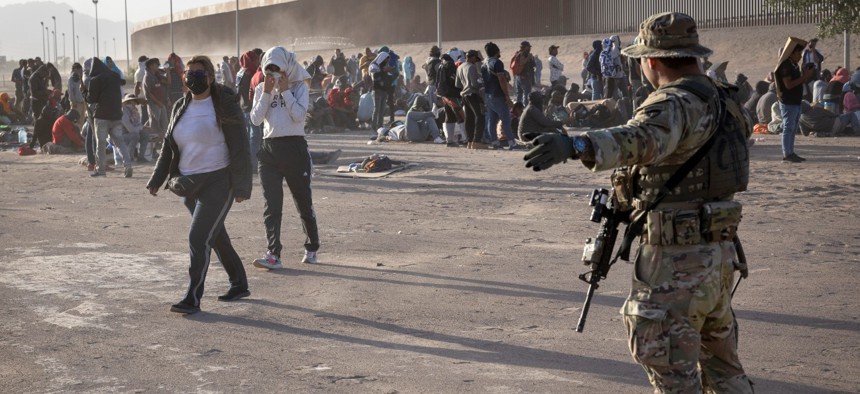
A Texas National Guard soldier directs immigrants during a dust storm at a makeshift camp located between the Rio Grande and the U.S.-Mexico border fence on May 10 in El Paso, Texas. The president is sending thousands of federal personnel to help at the border in response to a policy change expected to double the number of daily migrant encounters at the southwest border. John Moore/Getty Images
Biden Deploys Thousands to the Border, and Some of the New Assignments Aren't Optional
At least some staff at the departments of Homeland Security and Defense are facing mandatory assignments as an expected migrant surge strains resources.
This story was updated on May 11 at 5:15 with additional comment
The Biden administration is moving around thousands of employees to support federal personnel ahead of an expected significant increase in migrants arriving at the U.S.-Mexico border in hopes the additional assistance will help mitigate the chaos as a key policy expires.
About 1,400 Homeland Security Department employees will join the 1,500 Defense Department personnel going to the border as Title 42 ends Thursday, DHS Secretary Alejandro Mayorkas said. The pandemic-era policy allowed border personnel to quickly turn away most migrants without adjudicating potential asylum claims, but the Biden administration ended its use by court order. Officials have estimated the change could at least double the number of migrant encounters per day at the southwest border.
About 1,000 of the deployed staff will come from U.S. Citizenship and Immigration Services and will quickly conduct migrant interviews to determine eligibility for asylum, Mayorkas said. The administration has stressed it plans to expand its use of expedited removal procedures to quickly deport new arrivals. It has also finalized its new asylum rule, which significantly restricts asylum access for those who cross the border unlawfully.
DHS will send nearly 200 Federal Air Marshals to the border as well, restarting a process it began—and subsequently paused—last fall. The deployments are mandatory, Dave Londo, president of the Air Marshals National Council, said, and employees will be sent for 21-day rotations. Last year, the air marshals assisted with duties such as hospital watch, transportation and welfare checks. While DHS has maintained that the deployments would not threaten safety on passenger flights, Londo decried the decision as “crazy” and said it would damage morale in the workforce.
According to a report from CNN, the Secret Service is also sending employees to assist at the border. A DHS spokesperson said in addition to the mandatory assignments, DHS was soliciting employees "willing to volunteer" to "serve in non-law enforcement capacities, such as helping store and label property of those detained, picking up needed supplies, basic housekeeping, data entry, or transporting files to and from [Customs and Border Protection] locations." On top of those from other components, CBP will have 24,000 agents and officers in the area.
Earlier in his tenure, President Biden tapped the Federal Emergency Management Agency to address a record increase in migrant children at the border. FEMA, CBP, Federal Protective Service, Immigration and Customs Enforcement and other DHS employees have all in recent years deployed through the department's Volunteer Force to staff shelters, provide security and offer other support. DHS personnel are also deploying internationally as part of an effort to help process potential migrants where they reside before they travel to the United States.
When the Biden administration first rolled out its plan for the end of Title 42 last year, it previewed that it would send officers, agents and other staff throughout its workforce to address and process the anticipated increased stream of immigrants. It also left open the possibility it would ask for personnel assistance from other federal agencies, though no such request has yet been issued.
Mayorkas said DHS will require additional funding to support its efforts, noting Congress provided only half of its emergency request as part of the fiscal 2023 omnibus spending bill. Administration officials have emphasized that processing migrants under the normal immigration authorities, rather than the emergency Title 42 provisions, would lead to greater deterrence. Under those proceedings, the United States can impose a five-year ban on anyone who illegally crosses the border and can pursue criminal punishments for those who make multiple attempts.
Encounters at the border had already ticked up in recent days before Title 42 expired, increasing the strain on government resources. Still, Mayorkas vowed his department would be up for the challenge.
“I think that there is no question that this is going to be extremely challenging,” Mayorkas said last week. “I do not want to understate the severity of the challenge that we expect to encounter.” He added DHS has “the greatest workforce in the world to fulfill our mission, and we will do so.”
On Wednesday, he cautioned it could take some time for the impacts of the administration’s efforts to be felt.
“This places an incredible strain on our personnel, our facilities and our communities with whom we partner closely,” Mayorkas said. “Our plan will deliver results but it will take time for those results to be fully realized and it is essential that we all take this into account.”







